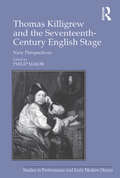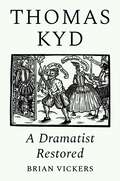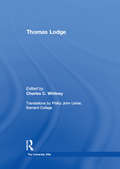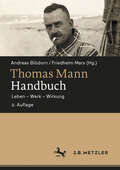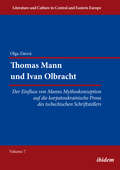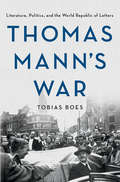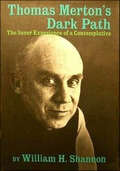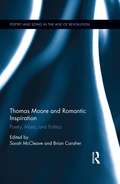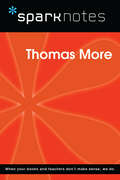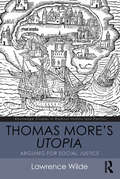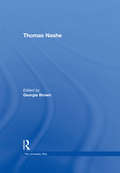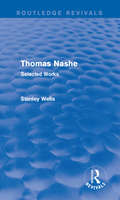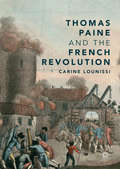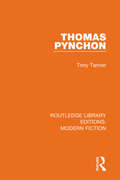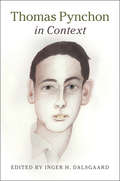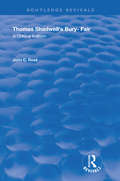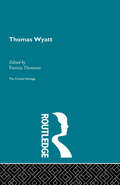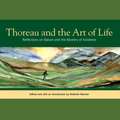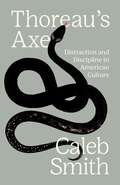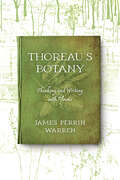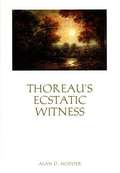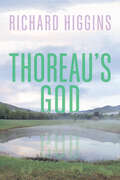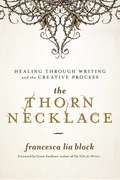- Table View
- List View
Thomas Killigrew and the Seventeenth-Century English Stage: New Perspectives (Studies in Performance and Early Modern Drama)
by Philip MajorDespite his significant influence as a courtier, diplomat, playwright and theatre manager, Thomas Killigrew (1612-1683) remains a comparatively elusive and neglected figure. The original essays in this interdisciplinary volume shine new light on a singular, contradictory Englishman 400 years after his birth. They increase our knowledge and deepen our understanding not only of Killigrew himself, but of seventeenth-century dramaturgy, and its complex relationship to court culture and to evolving aesthetic tastes. The first book on Killigrew since 1930, this study re-examines the significant phases of his life and career: the little-known playwriting years of the 1630s; his long exile during the 1640s and 1650s, and its personal, political and literary repercussions; and the period following the Restoration, when, with Sir William Davenant, he enjoyed a monopoly of the London stage. These fresh accounts of Killigrew build on the recent resurgence of interest in royalists and the royalist exile, and underscore literary scholars' continued fascination with the Restoration stage. In the process, they question dominant assumptions about neatly demarcated seventeenth-century chronological, geographic and cultural boundaries. What emerges is a figure who confounds as often as he justifies traditional labels of dilettante, cavalier wit and swindler.
Thomas Kyd: A Dramatist Restored
by Brian VickersA groundbreaking new account of the author of The Spanish Tragedy that establishes him as a major Elizabethan dramatistThomas Kyd (1558–1594) was a highly regarded dramatist and the author of The Spanish Tragedy, the first revenge tragedy and the most influential Elizabethan play. In this first full study of his life and works, Brian Vickers discusses Kyd&’s accepted canon as well as three additional plays Vickers has newly identified as having been written by Kyd—exciting discoveries that establish him as a major dramatist.Thomas Dekker, a fellow Elizabethan dramatist, referred to &“industrious Kyd,&” which suggests a greater output than the three plays traditionally attributed to him—The Spanish Tragedy, Soliman and Perseda, and Cornelia. Kyd worked between 1585 and 1594, when the plague led to the anonymous publication of many plays because of the breakup of several London theatre companies. Researching this corpus, Vickers has identified Kyd&’s authorship of three more plays: Arden of Faversham, the first domestic tragedy, King Leir and his three daughters, a tragicomedy that provided Shakespeare with his main source, and Fair Em, a love comedy. These attributions are based on two forms of evidence: unique similarities of plot between Kyd&’s acknowledged and newly attributed plays and many unique phrases shared by all six plays as identified by modern software.Discussing all the plays in detail and placing them in biographical and historical context, Thomas Kyd offers a major reassessment of an underappreciated Elizabethan playwright.
Thomas Lodge (The University Wits)
by Charles C. WhitneyThomas Lodge was the most versatile of the pioneering professional writers of the English Renaissance, experimenting in an astonishing variety of forms. His long, eventful, and well-documented life makes him one of the most individualized figures of his age, and yet also one of the most representative. This is the first-ever collection of Lodge scholarship. It comprises a selection of the best and most important biographical and critical work, ranging from 1932 to 2008 and including first-time English translations. Charles Whitney's discerning introduction discusses each article or book chapter in the context of Lodge scholarship and beyond, and is supplemented by a bibliography of additional material. This unique collection offers a distinctive vantage on both Lodge and many current topics in Renaissance and early modern studies such as humanism, republicanism, romance, intertextuality, plagiarism, gender, colonization, Shakespearean sources, the histories of print and of reading, authorship, and English Catholicism and religious conflict.
Thomas Mann-Handbuch: Leben – Werk – Wirkung
by Andreas Blödorn Friedhelm MarxDer Literaturnobelpreisträger von 1929: Thomas Mann gehört zu den produktivsten, wichtigsten und wirkungsreichsten deutschsprachigen Autoren der Moderne. Seine Romane, Erzählungen, Essays, Briefe und Tagebücher reflektieren und prägen die erste Hälfte des 20. Jahrhunderts in einer Weise, wie es kaum einem anderen Schriftsteller gelungen ist. Das Handbuch umfasst fundierte Einzelbeiträge zum literarischen Werk und dessen Kontext, zu wichtigen Motiven und aktuellen Forschungstendenzen. Neben der Werkschau enthält es einen ausführlichen Teil zur Person im Kontext der Zeit und zur Rezeption bis hin zu den aktuellen Verfilmungen. Die zweite, aktualisierte Auflage wurde um zahlreiche Einzelbeiträge zu wichtigen Texten sowie zu politischen und poetologischen Aspekten seines Werks und um ausgewählte Illustrationen erweitert.
Thomas Mann und Ivan Olbracht [German-language Edition]: Der Einfluss von Manns Mythoskonzeption auf die karpatoukrainische Prosa des tschechischen Schriftstellers (Literature and Culture in Central and Eastern Europe #7)
by Olga ZitováZitovás literary analysis starts at the interface of Czech and German literature in the first half of the twentieth century. Thomas Mann's novel Joseph and His Brothers is set in comparative relation to Ivan Olbracht's prose texts Nikola Šuhaj loupe ník and Golet v údolí. Olbracht translated three volumes of Mann's Joseph's tetralogy parallel to the composition of his own prose works. Zitová examines the influence of Olbracht's translation work on his own work. Zitovás literaturwissenschaftliche Analyse setzt an einer Schnittstelle der tschechischen und deutschen Literatur in der ersten Hälfte des zwanzigsten Jahrhunderts an. Thomas Manns Roman Joseph und seine Brüder wird vergleichend in Beziehung gesetzt zu Ivan Olbrachts in den dreißiger Jahren entstandenen Prosatexten Nikola Šuhaj loupe ník und Golet v údolí. Olbracht übersetzte parallel zur Abfassung seiner Prosawerke insgesamt drei Bände aus Manns umfangreicher Josephs-Tetralogie. Diese Übersetzertätigkeit blieb, wie Zitová aufzeigt, nicht ohne Einfluss auf sein eigenes Schaffen. Das Buch knüpft an eine von Jirí Opelík geschriebene Studie Olbrachts reife Schaffensperiode sub specie seiner Übersetzungen aus Thomas Mann und Lion Feuchtwanger (1967) an, in der dieser tschechische Literaturwissenschaftler das Thema eröffnete. Mit Zitovás Tiefenanalyse schließt sich diese germanobohemistische Forschungslücke.
Thomas Mann's The Magic Mountain (Modern Critical Interpretations)
by Harold BloomEssays by Hermann J. Wiegand, Erich Heller, Georg Lukacs, C. E. Williams, T. J. Reed, W. H. Bruford, Henry Hatfield, and Alexander Nehamas.
Thomas Mann's War: Literature, Politics, and the World Republic of Letters
by Tobias BoesIn Thomas Mann's War, Tobias Boes traces how the acclaimed and bestselling author became one of America's most prominent anti-fascists and the spokesperson for a German cultural ideal that Nazism had perverted.Thomas Mann, winner of the 1929 Nobel Prize in literature and author of such world-renowned novels as Buddenbrooks and The Magic Mountain, began his self-imposed exile in the United States in 1938, having fled his native Germany in the wake of Nazi persecution and public burnings of his books. Mann embraced his role as a public intellectual, deftly using his literary reputation and his connections in an increasingly global publishing industry to refute Nazi propaganda. As Boes shows, Mann undertook successful lecture tours of the country and penned widely-read articles that alerted US audiences and readers to the dangers of complacency in the face of Nazism's existential threat. Spanning four decades, from the eve of World War I, when Mann was first translated into English, to 1952, the year in which he left an America increasingly disfigured by McCarthyism, Boes establishes Mann as a significant figure in the wartime global republic of letters.
Thomas Merton's Dark Path: The Inner Experience of a Contemplative
by William H. ShannonIn the mystical tradition the "dark," or apophatic way has a long history. It is the way of John of the Cross, of Master Eckhart, of Juliana of Norwich, of the anonymous author of The Cloud of Unknowing, and of Thomas Merton. This dark path of contemplation that Merton followed, wrote about extensively, and considered the focal point of his life is the subject of William H. Shannon's book.
Thomas Moore and Romantic Inspiration: Poetry, Music, and Politics (Poetry and Song in the Age of Revolution)
by Sarah McCleave Brian G. CaraherWritten by internationally established scholars of Thomas Moore’s music, poetry, and prose writing, Thomas Moore and Romantic Inspiration is a collection of twelve essays and a timely response to significant new biographical, historiographical and editorial work on Moore. This collection reflects the rich variety of cutting-edge work being done on this significant and prolific figure. Sarah McCleave and Brian Caraher have contributed an introduction that positions Moore in his own time (1800-1850), addresses subsequent neglect in the twentieth century, and contextualises the contemporary re-evaluation of Thomas Moore as a figure of considerable interdisciplinary artistic and cultural significance. The contributions to this collection establish Moore’s importance in the fields of Neoclassical and Romantic lyricism, musical performance, song-writing, postcolonial criticism, Orientalism and biographical writing— as well as defining the significance of his voice as an engaged social and political commentator of a strongly cosmopolitan and pluralistic inclination.
Thomas More (SparkNotes Philosophy Guide)
by SparkNotesThomas More (SparkNotes Philosophy Guide) Making the reading experience fun! SparkNotes Philosophy Guides are one-stop guides to the great works of philosophy–masterpieces that stand at the foundations of Western thought. Inside each Philosophy Guide you&’ll find insightful overviews of great philosophical works of the Western world.
Thomas More's Utopia: Arguing for Social Justice (Routledge Studies in Radical History and Politics)
by Lawrence WildeThe 500th anniversary of the first publication of Thomas More’s Utopia invites a reappraisal of its significance, not just as an ironic and playful fiction, but as a serious contribution to social and political thought. More delivers a searing critique of the injustices of his time and imagines a radical alternative based on common ownership and representative government. In this new interpretation, Wilde surveys the context from which Utopia emerged and analyses its key themes – politics, economics, social relations, crime and punishment, war and religion. Although the society of the Utopians is created as a remedy to the ailments of the old world, there are restrictions on individual freedom which reflect More’s suspicion of human nature’s innate fragility. Wilde argues that this should not detract from the power of the book in challenging the root causes of inequality and oppression. The true legacy of Utopia lies in its plea for social justice in the face of a world driven by greed and the lust for power. A compelling case is made for the continued relevance of this masterpiece, a legacy that should not be diminished by attempts to discredit More’s character, which are dealt with here in the epilogue. Offering a new perspective on this important historical text, this book is essential reading for students and scholars working in radical politics, the history of social thought and literature, as well as anyone interested in learning more about this fascinating work.
Thomas Nashe (The University Wits)
by Georgia BrownThe current surge of interest in the Elizabethan poet, dramatist, prose-writer and critic, Thomas Nashe, follows years of neglect or undisguised hostility. Yet, as early allusions testify, Nashe was a name which imposed itself on contemporary culture. Nashe annoyed and even disturbed his contemporaries, but they certainly paid attention to him because he pioneered new approaches to writing, and indeed to living, and because he was an astute critic. The essays in this volume have been chosen for the skill with which they present diverse approaches to key issues in Nashe. All Nashe's texts are covered, as are his relationships with contemporaries, like Shakespeare. The introduction analyses different approaches, locating them in the history of Nashe criticism, and suggests areas for future research. It argues that Nashe's importance to Renaissance studies lies in his anomalousness, as he forces us to rethink the Renaissance. He makes the Renaissance unfamiliar again, and pushes criticism out of its comfort zone.
Thomas Nashe: Selected Works (Routledge Revivals)
by Stanley WellsThis book, first published in 1964, is devoted to Thomas Nashe. Shakespeare’s plays have many apparent echoes of his matter and style; he was one of the most adventurous and successful of those who tried to explore the possibilities of the language and to embellish it was an eloquence both learned and popular. Moreover, he is a conscientious and delighted portrayer of the London of his time; he combines the interests of a Mayhew with the exuberance of a Dylan Thomas. This book will be of interest to students of literature.
Thomas Paine and the French Revolution
by Carine LounissiThis book explores Thomas Paine's French decade, from the publication of the first part of Rights of Man in the spring of 1791 to his return trip to the United States in the fall of 1802. It examines Paine's multifarious activities during this period as a thinker, writer, member of the French Convention, lobbyist, adviser to French governments, officious diplomat and propagandist. Using previously neglected sources and archival material, Carine Lounissi demonstrates both how his republicanism was challenged, bolstered and altered by this French experience, and how his positions at key moments of the history of the French experiment forced major participants in the Revolution to defend or question the kind of regime or of republic they wished to set up. As a member of the Lafayette circle when writing the manuscript of Rights of Man, of the Girondin constellation in the Convention, one of the few democrats who defended universal suffrage after Thermidor, and as a member of the Constitutional Circle which promoted a kind of republic which did not match his ideas, Paine baffled his contemporaries and still puzzles the present-day scholar. This book intends to offer a new perspective on Paine, and on how this major agent of revolutions contributed to the debate on the French Revolution both in France and outside France.
Thomas Pynchon (Routledge Library Editions: Modern Fiction #23)
by Tony TannerThomas Pynchon is now recognized as a major contemporary novelist and perhaps the most important American writer since Melville. His work is both richly imaginative and amazingly erudite and can be compared, in its complexity, linguistic playfulness and experimentation and wealth of allusion, to the work of James Joyce. Aspects of history, psychology, technology and science, cultural and political movements, problems of identity and society and the status and function of fiction and narrative in the modern world are all dramatized with extraordinary wit and power. Tony Tanner provides a brief, comprehensive introduction to his work. Against the background of Pynchon the man, this book, originally published in 1982, examines in detail his early short stories (some of which are not easily accessible) and offers a guide to the reading of his novels, V., The Crying of Lot 49 and Gravity’s Rainbow. Many of Pynchon’s recurrent themes, from entropy and information theory to his interest in the operations and divisions of power in the world since the Second World War, are considered. Finally, Tony Tanner places Pynchon and his work in a broader cultural and literary context.
Thomas Pynchon and American Counterculture
by Joanna FreerThomas Pynchon and the American Counterculture employs the revolutionary sixties as a lens through which to view the anarchist politics of Pynchon's novels. Joanna Freer identifies and elucidates Pynchon's commentaries on such groups as the Beats, the New Left and the Black Panther Party and on such movements as the psychedelic movement and the women's movement, drawing out points of critique to build a picture of a complex countercultural sensibility at work in Pynchon's fiction. In emphasising the subtleties of Pynchon's responses to counterculture, Freer clarifies his importance as an intellectually rigorous political philosopher. She further suggests that, like the graffiti in Gravity's Rainbow, Pynchon creates texts that are 'revealed in order to be thought about, expanded on, translated into action by the people', his early attraction to core countercultural values growing into a conscious, politically motivated writing project that reaches its most mature expression in Against the Day.
Thomas Pynchon in Context (Literature in Context)
by Inger H. DalsgaardThomas Pynchon in Context guides students, scholars and other readers through the global scope and prolific imagination of Pynchon's challenging, canonical work, providing the most up-to-date and authoritative scholarly analyses of his writing. This book is divided into three parts. The first, 'Times and Places', sets out the history and geographical contexts both for the setting of Pynchon's novels and his own life. The second, 'Culture, Politics and Society', examines twenty important and recurring themes which most clearly define Pynchon's writing - ranging from ideas in philosophy and the sciences to humor and pop culture. The final part, 'Approaches and Readings', outlines and assesses ways to read and understand Pynchon. Consisting of Forty-four essays written by some of the world's leading scholars, this volume outlines the most important contexts for understanding Pynchon's writing and helps readers interpret and reference his literary work.
Thomas Shadwell's Bury-Fair: A Critical Edition (Routledge Revivals)
by John C. RossFirst published in 1995, Ross provides a critical edition of Thomas Shadwell’s Bury Fair.
Thomas Wyatt: The Critical Heritage (Critical Heritage Ser.)
by Patricia ThomsonFirst Published in 1995. Routledge is an imprint of Taylor & Francis, an informa company.
Thoreau and the Art of Life: Reflections on Nature and the Mystery of Existence
by Henry David Thoreau Roderick Maciver Editor IllustratorThoreau and the Art of Life collects eloquent passages from the writings of the seminal author and philosopher. Drawn mainly from his journals, the short excerpts provide fascinating insight into his thought processes by presenting his raw, unedited feelings about the things that meant the most to him. The book reflects Thoreau's deep beliefs and ideas about nature, relationships, creativity, spirituality, ageing, simplicity, and wisdom. By eloquently expressing his thoughts about life and what gives it value, he leads the reader to a closer examination of life. Thoreau's work asks us to live our own truths with joy and discipline and to recognize that we live in a universe of extraordinary beauty, mystery, and wonder. An avid reader of Thoreau, editor and illustrator Roderick MacIver organized the passages by themes. The book includes a chronology and brief biography. Thoreau's words of wisdom combined with MacIver's vivid illustrations of the American landscape will resonate with nature enthusiasts and a broad range of readers interested in art, environmentalism, literature, and philosophy.
Thoreau's Axe: Distraction and Discipline in American Culture
by Caleb SmithHow nineteenth-century “disciplines of attention” anticipated the contemporary concern with mindfulness and being “spiritual but not religious”Today, we’re driven to distraction, our attention overwhelmed by the many demands upon it—most of which emanate from our beeping and blinking digital devices. This may seem like a decidedly twenty-first-century problem, but, as Caleb Smith shows in this elegantly written, meditative work, distraction was also a serious concern in American culture two centuries ago. In Thoreau’s Axe, Smith explores the strange, beautiful archives of the nineteenth-century attention revival—from a Protestant minister’s warning against frivolous thoughts to Thoreau’s reflections on wakefulness at Walden Pond. Smith examines how Americans came to embrace attention, mindfulness, and other ways of being “spiritual but not religious,” and how older Christian ideas about temptation and spiritual devotion endure in our modern ideas about distraction and attention.Smith explains that nineteenth-century worries over attention developed in response to what were seen as the damaging mental effects of new technologies and economic systems. A “wandering mind,” once diagnosed, was in need of therapy or rehabilitation. Modeling his text after nineteenth-century books of devotion, Smith offers close readings of twenty-eight short passages about attention. Considering social reformers who designed moral training for the masses, religious leaders who organized Christian revivals, and spiritual seekers like Thoreau who experimented with regimens of simplified living and transcendental mysticism, Smith shows how disciplines of attention became the spiritual exercises of a distracted age.
Thoreau’s Botany: Thinking and Writing with Plants (Under the Sign of Nature)
by James Perrin WarrenThoreau’s last years have been the subject of debate for decades, but only recently have scholars and critics begun to appreciate the posthumous publications, unfinished manuscripts, and Journal entries that occupied the writer after Walden (1854). Until now, no critical reader has delved deeply enough into botany to see how Thoreau’s plant studies impact his thinking and writing. Thoreau’s Botany moves beyond general literary appreciation for the botanical works to apply Thoreau’s extensive studies of botany—from 1850 to his death in 1862—to readings of his published and unpublished works in fresh, interdisciplinary ways. Bringing together critical plant studies, ecocriticism, and environmental humanities, James Perrin Warren argues that Thoreau’s botanical excursions establish a meeting ground of science and the humanities that is only now ready to be recognized by readers of American literature and environmental literature.
Thoreau's Ecstatic Witness
by Alan D. Hodder"When Henry David Thoreau died in 1862, friends and admirers remembered him as an eccentric man whose outer life was continuously fed by deeper spiritual currents. But scholars have since focused almost exclusively on Thoreau's literary, political, and scientific contributions. This book offers the first in-depth study of Thoreau's religious thought and experience. In it Alan D. Hodder recovers the lost spiritual dimension of the writer's life, revealing a deeply religious man who, despite his rejection of organized religion, possessed a rich inner life, characterized by a sort of personal, experiential, nature-centered, and eclectic spirituality that finds wider expression in America today. " "At the heart of Thoreau's life were episodes of exhilaration in nature that he commonly referred to as his ecstasies. Hodder explores these representations of ecstasy throughout Thoreau's writings - from the riverside reflections of his first book through Walden and the later journals, when he conceived his journal writing as a spiritual discipline in itself and a kind of forum in which to cultivate experiences of contemplative non-attachment. In doing so, Hodder restores to our understanding the deeper spiritual dimension of Thoreau's life to which his writings everywhere bear witness. "--BOOK JACKET. Title Summary field provided by Blackwell North America, Inc. All Rights Reserved
Thoreau's God
by Richard HigginsMeditative reflections on the great spiritual seeker’s deeply felt experience of the divine. Henry David Thoreau’s spiritual life is a riddle. Thoreau’s passionate critique of formal religion is matched only by his rapturous descriptions of encounters with the divine in nature. He fled the church only to pursue a deeper communion with a presence he felt at the heart of the universe. He called this illimitable presence many names, but he often called it God. In Thoreau’s God, Richard Higgins invites seekers—religious or otherwise—to walk with the great Transcendentalist through a series of meditations on his spiritual life. Thoreau offers us no creed, but his writings encourage reflection on how to live, what to notice, and what to love. Though his quest was deeply personal, Thoreau devoted his life to communicating his experience of an infinite, wild, life-giving God. By recovering this vital thread in Thoreau’s life and work, Thoreau’s God opens the door to a new understanding of an original voice in American religion that speaks to spiritual seekers today.
The Thorn Necklace: Healing Through Writing and the Creative Process
by Francesca Lia Block Grant FaulknerFor devotees of Bird by Bird and The Artist's Way, a memoir-driven guide to healing through the craft of writingFrancesca Lia Block is the bestselling author of more than twenty-five books, including the award-winning Weetzie Bat series. Her writing has been called "transcendent" by The New York Times, and her books have been included in "best of" lists compiled by Time magazine and NPR. In this long-anticipated guide to the craft of writing, Block offers an intimate glimpse of an artist at work and a detailed guide to help readers channel their own experiences and creative energy. Sharing visceral insights and powerful exercises, she gently guides us down the write-to-heal path, revealing at each turn the intrinsic value of channeling our experiences onto the page. Named for the painting by Frida Kahlo, who famously transformed her own personal suffering into art, The Thorn Necklace offers lessons on life, love, and the creative process.
